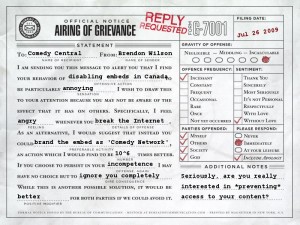More and more, there appear to be cracks appearing in the unified facade of media on the Internet – and this is not a good thing. The example which irks me the most is when traditional media hamfistedly attempts to put content online, and then erects artificial barriers to viewing that content based on the user’s geographic location. A perfect example: the behaviour of Comedy Central’s embedded videos when viewed from Canada.
If you’re cruising through the Internet from Canada and come across an embedded Comedy Central video, this is what you see:

Available on the Internet! *except in Canada
I imagine the conversation at Comedy Central went something like this:
- “Hey! Let’s put our content online to drive awareness of our programs!”
- “And you know what would be cool? What if we let people embed our content on other sites, essentially advertising our programs to new audiences for free!”
- “Hmm, wait a minute. We’d better make sure we don’t piss off partners in other countries that license our content – let’s prevent people in other countries from viewing that embedded content.”
I understand the logic of #3 – Comedy Central licenses its content to other media players in other countries (in Canada, it’s the Comedy Network – a near-verbatim copy of Comedy Central). Of course, those licensees want people to understand that in certain geographies, the content is available from them, not Comedy Central. The problem is that #3 completely undermines #1 and #2; as implemented, the licensee completely fails to capitalize on the distributed, border-less nature of the Internet.
Instead of gaining a follower, this behavior simple annoys the user – after all, who really says to themselves “Oh, I get it – I guess I’ll just navigate to the Comedy Network and hunt down this clip to see it“? Nobody, that’s who. Instead, the user says to themselves: “Wow, these guys are idiots because they don’t let me see the video. Oh well, luckily there’s a whole bunch of other stuff on the Internet. I’ll just go and watch those things instead.”
All it does is annoy the very audience the company is trying to reach:
The funny part here is that there is a simple solution: simply brand the player interface depending on the user’s location. If the user is from the US, brand it as “Comedy Central”; if it’s in Canada, brand it as “The Comedy Network”. If the user clicks on the embed, take them to the right site for their country. Easy.
My advice for media companies: as you venture online, ask yourself how you can interest as many people as possible in your content, and make the country-specific licensee issues as transparent to the user as possible.

